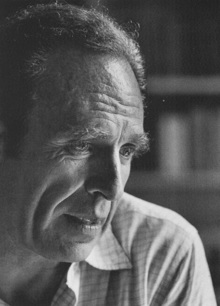Adolfo Bioy Casares
| Adolfo Bioy Casares | |
|---|---|

Bioy Casares in 1968
|
|
| Born |
September 15, 1914 Buenos Aires, Argentina |
| Died | March 8, 1999 (aged 84) Buenos Aires, Argentina |
| Resting place | La Recoleta Cemetery, Buenos Aires, Argentina |
| Occupation | Writer, poet, critic, librarian |
| Language | Spanish |
| Nationality | Argentine |
| Notable works | The Invention of Morel |
| Notable awards | Miguel de Cervantes Prize (1991) |
Adolfo Bioy Casares (Spanish pronunciation: [aˈðolfo ˈβjoi kaˈsaɾes]; September 15, 1914 – March 8, 1999) was an Argentine fiction writer, journalist, and translator. He was a friend and frequent collaborator with his fellow countryman Jorge Luis Borges, and wrote what many consider one of the best pieces of fantastic fiction, the novella The Invention of Morel.
Adolfo Bioy Casares was born on September 15, 1914 in Buenos Aires, the only child of Adolfo Bioy Domecq and Marta Ignacia Casares Lynch. He was born in Recoleta, a neighborhood of Buenos Aires traditionally inhabited by upper-class families, where he would reside the majority of his life. Due to his family's high social class, he was able to dedicate himself exclusively to literature and, at the same time, distinguish his work from the traditional literary medium of his time. He wrote his first story ("Iris y Margarita") at the age of eleven. He began his secondary education in the Instituto Libre de Segunda Enseñanza at the Universidad de Buenos Aires. Later, he started but did not end up finishing degrees in law, philosophy, and literature. Fueled by disappointment with the university atmosphere, he moved to a family ranch where, when he didn't have visitors, he devoted himself almost entirely to his study of literature. By the time he reached his late twenties, he maintained proficiency in english, french (which he spoke from the age of 4), german, and, of course spanish. Between 1929 and 1937 Bioy Casares published a number of books (Prólogo, 17 disparos contra lo porvenir, Caos, La nueva tormenta, La estatua casera, Luis Greve, muerto) that he would later disdain, restricting additional publications and refusing to discuss them, labeling all his work previous to 1940 as 'horrible'.
...
Wikipedia
